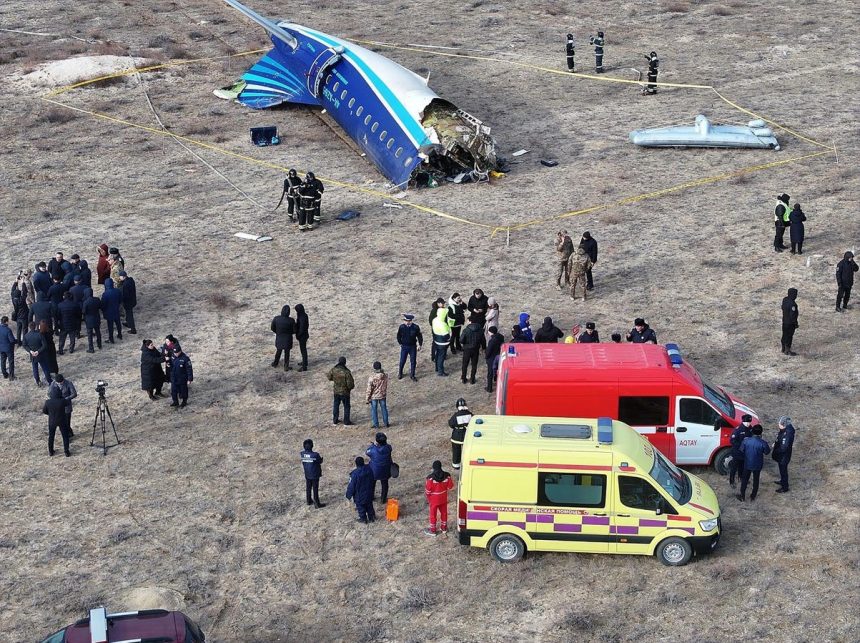The tragic Christmas Day crash of Azerbaijan Airlines Flight 8243, en route from Baku, Azerbaijan to Grozny, Russia, has sparked an international investigation and cast a pall of suspicion over Russia’s involvement. The aircraft, carrying 62 passengers and crew, deviated from its planned course and ultimately crashed near Aktau airport in Kazakhstan, claiming the lives of 38 individuals. While 29 passengers and five crew members miraculously survived, the incident has raised serious questions about the cause of the crash, with conflicting narratives emerging from the involved parties. Initial reports from Russia attributed the catastrophe to a combination of bird strike and adverse weather conditions, a claim met with skepticism by other nations and aviation experts. Azerbaijan Airlines, however, pointed towards “physical and technical interference” as the underlying reason, with the country’s transportation minister hinting at the possibility of “external interference.”
The incident took a sharper turn towards geopolitical intrigue when White House national security spokesman, John Kirby, revealed that initial U.S. assessments indicated the potential involvement of Russian air defense systems in the downing of the aircraft. Although Kirby stressed the ongoing nature of the investigation and refrained from disclosing further details, his statement amplified suspicions surrounding Russia’s role in the tragedy. This was further underscored by accounts from survivors who described hearing multiple loud bangs during the flight’s approach to Grozny, likened the aircraft’s behavior to being “drunk,” suggesting a sudden and unexpected alteration in its performance. These accounts, coupled with the U.S. initial assessment, painted a picture of a potential unintended consequence of Russia’s military activities in the region.
Adding further fuel to the fire, Ukrainian President Volodymyr Zelensky directly accused Russia of orchestrating the downing of the Azerbaijani airliner. Zelensky cited unspecified “clear visual evidence” from the crash site as substantiating his claim and called for international pressure on Moscow to uncover the truth and ensure accountability. He invoked the specter of the 2014 MH17 disaster, where a Malaysian Airlines flight was shot down over Ukraine by a Russian missile, resulting in the death of all 298 people onboard, as a cautionary tale against potential Russian attempts to obfuscate the truth. Zelensky’s accusations, while yet to be corroborated by conclusive evidence, heightened the already strained tensions between Ukraine and Russia.
Amidst the swirling accusations and counter-accusations, Russian President Vladimir Putin offered an apology for the “tragic incident” occurring within Russian airspace during a phone call with Azerbaijani President Ilham Aliyev. Significantly, Putin acknowledged that the Russian military was engaging Ukrainian drones over Grozny, the ill-fated flight’s intended destination, around the time of the crash. However, he stopped short of admitting direct Russian responsibility for the downing of the aircraft. The Kremlin’s statement, while expressing condolences, carefully avoided explicit admission of culpability, leaving room for alternative explanations and contributing to the ongoing ambiguity surrounding the event.
The investigation into the crash is being pursued by Azerbaijan, Kazakhstan, and Russia, each conducting independent inquiries. Russia has also initiated a criminal probe into the incident, signaling a commitment to uncovering the facts behind the tragic event. However, given the geopolitical sensitivities involved, the divergent narratives emerging from different parties, and the potential for conflicting interpretations of the evidence, achieving a universally accepted conclusion about the cause of the crash presents a formidable challenge. The incident highlights the complexities of modern warfare and the potential for unintended consequences when military actions intersect with civilian airspace.
The aftermath of the Azerbaijan Airlines crash mirrors the complex and often opaque investigations that follow such incidents in contested geopolitical landscapes. The conflicting narratives, the accusations and denials, and the delicate interplay of international relations all contribute to a challenging environment for establishing definitive conclusions. The incident has not only resulted in a devastating loss of life but also serves as a stark reminder of the fragility of civilian aviation in zones of military activity and the crucial importance of transparent and thorough investigations to prevent future tragedies. The world awaits the outcome of the ongoing investigations, hoping for clarity amidst the tragedy and a path towards accountability for those affected. The search for truth remains paramount, not just for the victims and their families, but also for the broader international community seeking to uphold the safety and security of civilian air travel.



